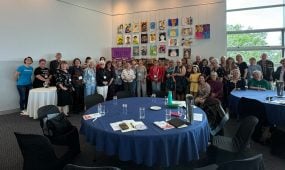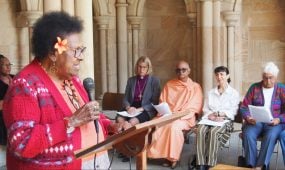2021 Diocesan Synod reflections: highlights and learnings
Reflections
Four clergy and lay people from across our Diocesan Regions share their Synod highlights and learnings with anglican focus readers
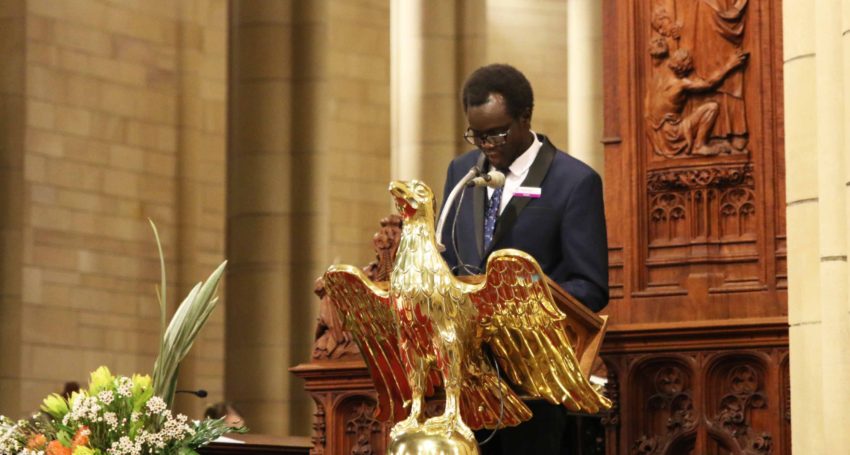
Four clergy and lay people from across our Regions share their Synod highlights, including Gabriel Deng from the Parish of Goodna, The Ven. Keith Dean-Jones from the Parish of Bundaberg, The Rev’d Selina McMahon from the Parish of Ipswich and Dylan Katthagen from the Parish of North Lakes.
Gabriel Deng – Synod Representative, Parish of Goodna
My favourite parts of Synod were giving the prayers in Friday night’s Eucharistic service in the Cathedral and standing up on Sunday to ask a question about South Sudanese youth connected to the Anglican community who are traumatised and acting out because of war, losing parents and mental illness.
My priest The Rev’d Bronwyn Pagram asked me on the Monday before Synod to read the prayers during the service. Two months before Synod started, I decided to get up during the question time and ask how the Anglican Church can help South Sudanese children and young adults. As a South Sudanese church leader, it is part of my role to stand up and represent my community. Being able to stand up and read prayers and ask questions make me feel part of the Anglican community, as well as the Australian community.
Advertisement
I didn’t want to sit at Synod for two to three days and do nothing and then return to my community without participating and contributing to the Synod. I will get up and speak at Synod again if I get a chance. I encourage other South Sudanese people to go to Synod to see how things are done and to volunteer as Synod Reps for their parishes or churches. By volunteering as Synod Reps and in other Church roles we are more integrated into the Australian community, which is important because it’s not good to be isolated. We need to share both our gifts and our problems so we can be integrated.
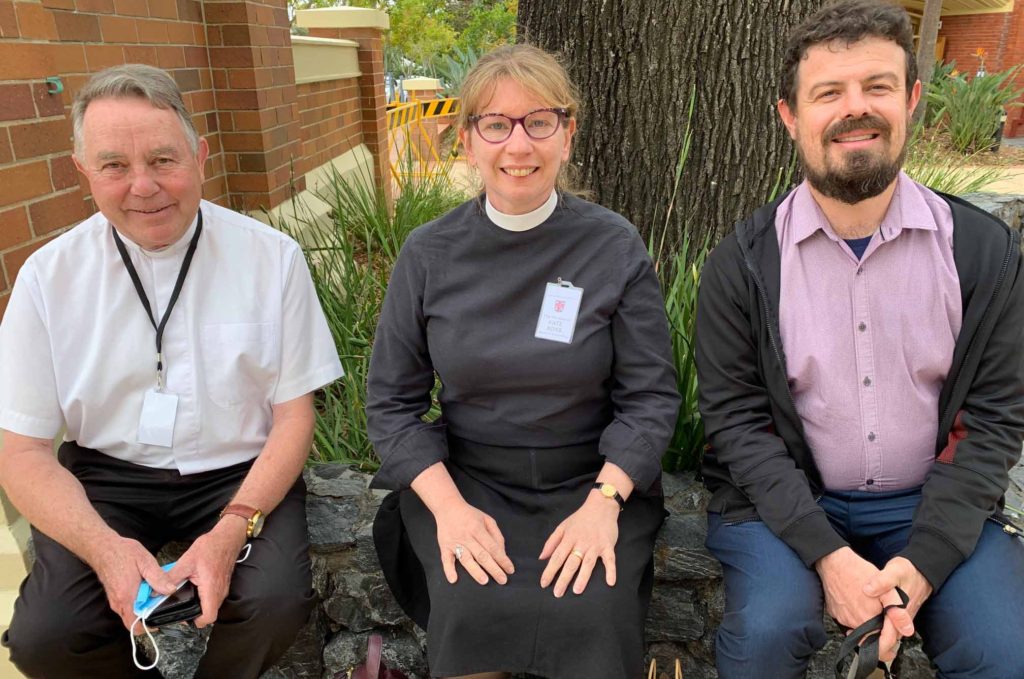
“I especially appreciated the contribution of the Archbishop as President: he encouraged participation, he kept Synod ‘on track’ with gentleness and humour and…he succeeded in expediting discussion” (The Parish of Bundaberg’s The Ven. Keith Dean-Jones, pictured with The Rev’d Kate Ross and Synod Rep, Christopher McLoughlin)
The Ven. Keith Dean-Jones OGS – Rector, Parish of Bundaberg and Archdeacon of Burnett
There were many good things about Synod 2021. I especially appreciated the contribution of the Archbishop as President: he encouraged participation, he kept Synod ‘on track’ with gentleness and humour and, despite the many issues that were scheduled for debate, he succeeded in expediting discussion.
The Anglican Church Southern Queensland is not a ‘one party state’. Although the ‘Catholic’ group has been historically dominant in representation, there are significant numbers of Evangelicals and liberal progressives. There are also many clergy and lay leaders who cannot be easily categorised. I think that our relationships ought not to be expressed in terms of ‘party politics’. I also think that attempts at ‘peace at any price’ fail to satisfy. The Archbishop affirms the importance of comprehensive Anglicanism. This is the recognition that truth is greater than individual or ‘party’ perceptions, and that we need one another as we seek the mind of Christ. Jesus taught that “the truth will set you free” (John 8.32). If we enter into dialogue with grace and loving kindness all sorts of wonderful things will happen.
Advertisement
I also think that we might be a humbler Church. Child sexual abuse and family violence have reminded us that we have failed in our relationships. We have not always protected the vulnerable. Coronavirus lockdowns have affected numerical strength to some degree and the ‘glory days’ of full churches on Sunday mornings are in the past. But, a renewed perception that we are to be a humbler Church, serving our communities and caring for people who are poor, lonely and vulnerable, has brought us closer to the ministry of Jesus.
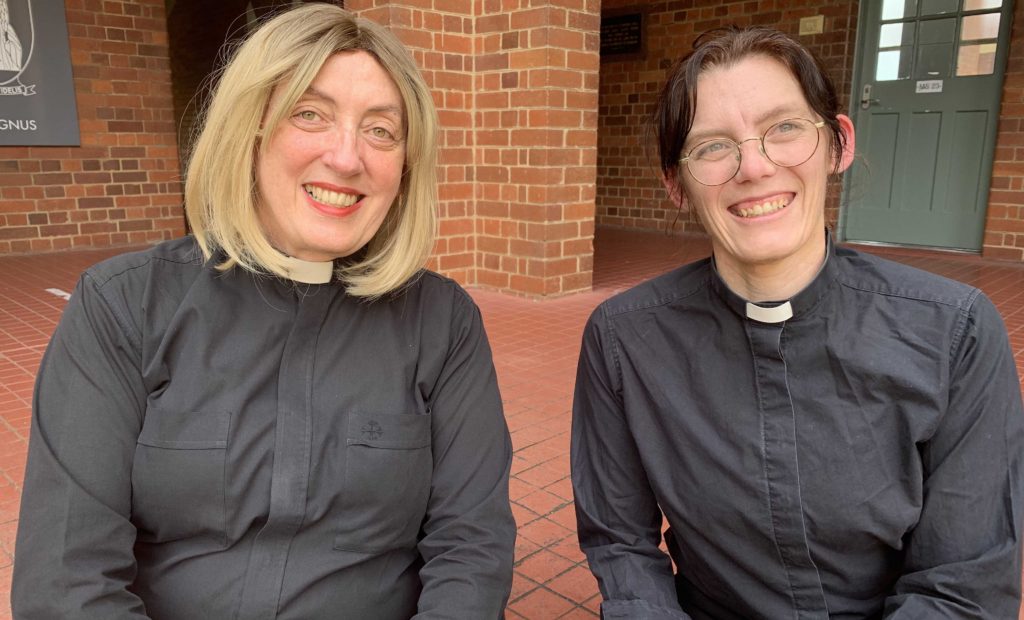
“I think it is in the spirit of this dialogue that saw two different positions on the subject of same-sex blessings come together and produce a united motion to dialogue the way forward” (The Rev’d Selina McMahon from The Parish of Ipswich, pictured with The Rev’d Dr Gemma Dashwood)
The Rev’d Selina McMahon – Rector, St Paul’s, Ipswich
So, Synod has come and gone. The implications of the motions passed are still to be felt, but the overall impressions of Synod are primarily ones of constructive discussion and debate. However, the camaraderie that is normally present at Synod was sadly muted somewhat this year, primarily due to the restrictions that were necessarily required as a result of COVID-19. It is difficult to have a conversation when masked and I missed the Saturday evening meal and the chance to establish new connections and renew old friendships.
This Synod was the first at which I have actually made a speech to second a motion and it was a lot less nerve-racking than I imagined. No longer does the Yorkshire adage “see all, hear all, say nowt,” apply. Sorry folks, but now that the genie has been let out of the bottle there is little chance of getting her back in!
This is the first Synod since my transition, and it was wonderful to see the way others (some of whom have deeply held beliefs that a transitioned priest should not be in charge of a parish) were able to still have open, honest and polite conversations with me. I think it is in the spirit of this dialogue that saw two different positions on the subject of same-sex blessings come together and produce a united motion to dialogue the way forward.
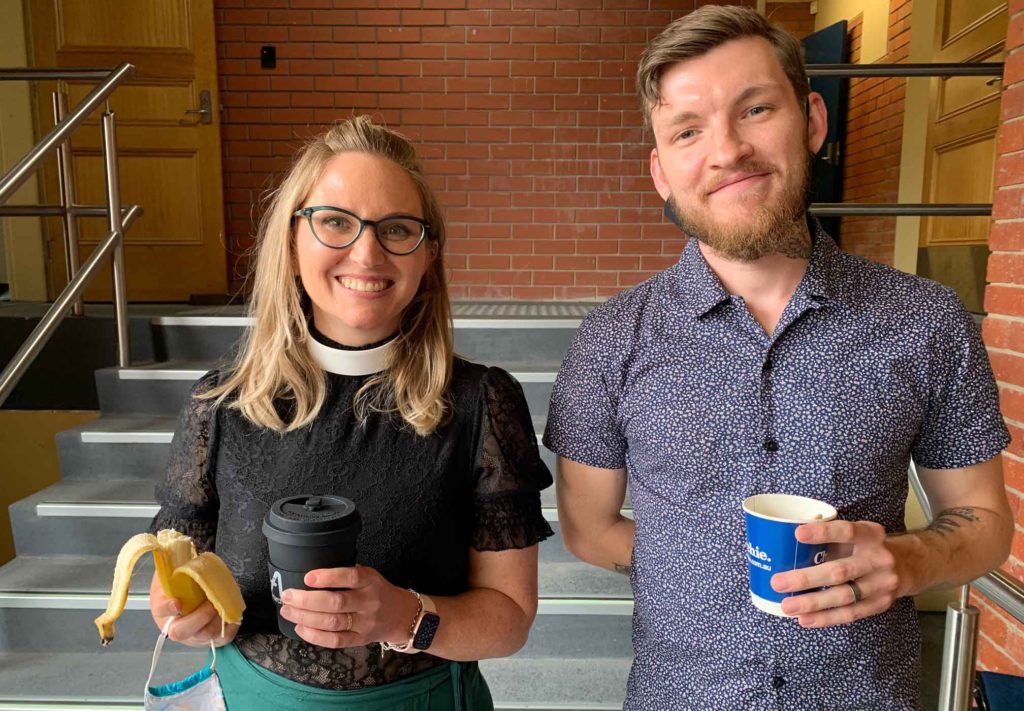
“At Synod, our Episcopal leaders set the standard and then consistently followed through. I hope to be able reflect that behaviour as I move forward into formation” (Dylan Katthagen, Parish of North Lakes, pictured with The Rev’d Elizabeth Donald McConnell from The Parish of Nundah)
Dylan Katthagen – Synod Representative, The Lakes Anglican Church
This newcomer to Synod was particularly impressed by the level of graciousness, humility and respect demonstrated by our Episcopal leaders. There was a time when a Regional Bishop tried to move a motion forward, only for his request to be rejected by the Synod. There were occasions when the Archbishop, as President, mispronounced a name or a title, and was subsequently corrected. And, there were instances when those responding on the floor, possibly out of nervousness, went off on a tangent or told a long story instead of directly and concisely addressing the matter at hand.
And yet, our Episcopal leaders refrained from engaging in any backchat or eye rolling. Instead, they kept their hearts and ears open, consistently demonstrating generosity, understanding and support. This commitment to dialogue and good conduct helped to keep Synod’s conversations constructive, creating space for healthy debate and sustaining a peaceful and productive environment.
As one entering into formation next year, I am encouraged and inspired by the examples of our Archbishop and Regional Bishops. I am reminded that as I grow in the areas of academia and Anglican ministry, there is always a need to “be quick to listen, slow to speak” (James 1.19). It takes wisdom grounded in experience to be able to direct and lead others forward, while at the same time being patient and humble. At Synod, our Episcopal leaders set the standard and then consistently followed through. I hope to be able reflect that behaviour as I move forward into formation.


